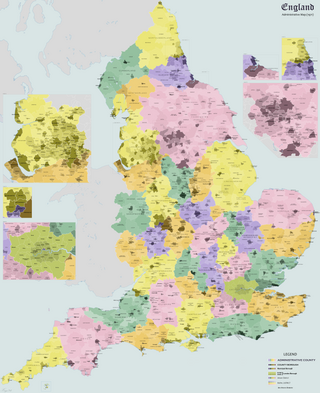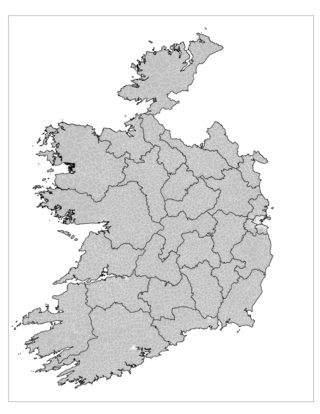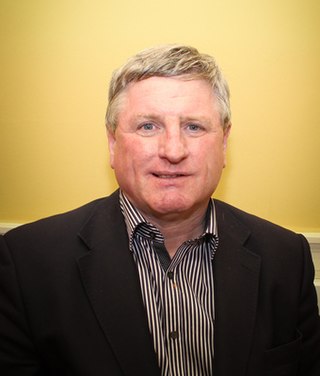Related Research Articles

The 1945 Irish presidential election was held on Thursday, 14 June 1945. It was Ireland's first contested presidential election. Outgoing president Douglas Hyde, who had served since 1938, decided not to seek a second term. Fianna Fáil nominated its deputy leader, Tánaiste Seán T. O'Kelly, as its candidate. Fine Gael nominated Seán Mac Eoin. Independent republican Patrick McCartan sought and failed to receive the necessary four nominations from local councils, but secured a nomination from Oireachtas members.

A municipal borough was a type of local government district which existed in England and Wales between 1836 and 1974, in Northern Ireland from 1840 to 1973 and in the Republic of Ireland from 1840 to 2002. Broadly similar structures existed in Scotland from 1833 to 1975 with the reform of royal burghs and creation of police burghs.

The 2004 Irish local elections were held in all the counties, cities and towns of Ireland on Friday, 11 June 2004, on the same day as the European elections and referendum on the amending the constitutional provisions on citizenship. Polling was delayed until 19 June 2004 in County Roscommon, due to the sudden death of Councillor Gerry Donnelly.

Galway City Council is the local authority of the city of Galway, Ireland. As a city council, it is governed by the Local Government Act 2001. The council is responsible for housing and community, roads and transportation, urban planning and development, amenity and culture, and environment. The council has 18 elected members. Elections are held every five years and are by single transferable vote. The head of the council has the title of mayor. The city administration is headed by a chief executive, Patricia Philbin. The council meets at City Hall, College Road, Galway.

An electoral division is a legally defined administrative area in the Republic of Ireland, generally comprising multiple townlands, and formerly a subdivision of urban and rural districts. Until 1996, EDs were known as district electoral divisions in the 29 county council areas and wards in the five county boroughs. Until 1972, DEDs also existed in Northern Ireland. The predecessor poor law electoral divisions were introduced throughout the island of Ireland in the 1830s. The divisions were used as local-government electoral areas until 1919 in what is now the Republic and until 1972 in Northern Ireland.
Cork Borough was a parliamentary constituency represented in Dáil Éireann, the lower house of the Oireachtas, from 1921 to 1969. The method of election was proportional representation by means of the single transferable vote (PR-STV).

The Electoral (Amendment) Act 1974 was a law in Ireland which revised Dáil constituencies. It was a review of parliamentary constituencies passed in Ireland by the governing Fine Gael–Labour Party National Coalition. It was intended to secure their re-election, but instead backfired disastrously resulting in a landslide victory for their main opponents in Fianna Fáil. Consequently, the word Tullymander – combining the name of the minister James Tully with the word "gerrymander" – was coined.

The 2009 Irish local elections were held in all the counties, cities and towns of Ireland on Friday, 5 June 2009, on the same day as the European Parliament election and two by-elections.

The 1991 Irish local elections were held in all administrative counties and county boroughs on Thursday, 27 June 1991.
The 1985 Irish local elections were held in all the local government areas on Thursday, 20 June 1985.
The 1967 Irish local elections were held in all the counties, cities and towns of Ireland on Wednesday, 28 June 1967. The result was a large gain in seats for Fine Gael, while Fianna Fáil and Labour remained largely unchanged on net seat totals. Others, including independents and Sinn Féin, lost many seats.

The 2014 Irish local elections were held in all local government areas of Ireland on Friday, 23 May 2014, on the same day as the European Parliament election and two by-elections. The poll in the Ballybay–Clones LEA on Monaghan County Council was deferred due to the death of a candidate.

The Local Government Reform Act 2014 is an act of the Oireachtas which provided for a major restructuring of local government in Ireland with effect from the 2014 local elections. It merged some first-tier county and city councils, abolished all second-tier town and borough councils, and created a new second tier of municipal districts covering rural as well as urban areas. It also provided for a plebiscite on whether to create a directly elected executive Mayor of the Dublin Metropolitan Area although this provision was not activated. The act was introduced as a bill on 15 October 2013 by Phil Hogan, the Minister for the Environment, Community and Local Government, and signed into law on 27 January 2014 by President Michael D. Higgins. Most of its provisions came into force on 1 June 2014.

An election to all 18 seats on Carlow County Council was held on 23 May 2014 as part of the 2014 Irish local elections. County Carlow was divided into two local electoral areas (LEAs) to elect councillors for a five-year term of office on the electoral system of proportional representation by means of the single transferable vote (PR-STV).

A by-election was held in the Dáil Éireann Carlow–Kilkenny constituency in Ireland on Friday, 22 May 2015, to fill the vacancy left by the resignation of Fine Gael Teachta Dála (TD) Phil Hogan on his appointment as European Commissioner. It was held on the same day as national referendums on marriage equality and the age of eligibility for election to the office of president. The Electoral (Amendment) Act 2011 stipulates that a by-election in Ireland must be held within six months of a vacancy occurring. The by-election writ was moved in the Dáil on 29 April 2015.
The 1945 local elections in Ireland were held on 14 June 1945 to fill all council seats for most counties and county boroughs and municipal towns. The state was still under the Emergency of the Second World War. As a cost-saving measure, electoral law was amended to bring forward the date of the local elections a few weeks to coincide with the 1945 presidential election.

The 2019 Irish local elections were held in all local authorities in Ireland on Friday, 24 May 2019, on the same day as the 2019 European Parliament election and a referendum easing restrictions on divorce. Each local government area is divided into local electoral areas (LEAs) where three to seven councillors are elected on the electoral system of proportional representation by means of the single transferable vote.

An election to all 29 seats on Louth County Council was held on 24 May 2019 as part of the 2019 Irish local elections. County Louth was divided into 5 local electoral areas (LEAs) to elect councillors for a five-year term of office on the electoral system of proportional representation by means of the single transferable vote (PR-STV).

An election to all 18 seats on Sligo County Council was held on 24 May 2019 as part of the 2019 Irish local elections. County Sligo was divided into 3 local electoral areas (LEAs) to elect councillors for a five-year term of office on the electoral system of proportional representation by means of the single transferable vote (PR-STV).
References
Sources
- Department of the Environment (1995). "Local elections, 1994" (PDF).
Citations
- ↑ Local Government Act 1994, s. 17 ( No. 8 of 1994, s. 17 ). Act of the Oireachtas . Archived from the original on 6 July 2017.Retrieved from Irish Statute Book on 13 April 2016.; Local Government (Boundaries) (Town Elections) Regulations 1994 ( S.I. No. 114 of 1994 ). Statutory Instrument of the Government of Ireland . Archived from the original on 22 October 2016.Retrieved from Irish Statute Book on 14 April 2016.
- ↑ DofE 1995, p. 121.